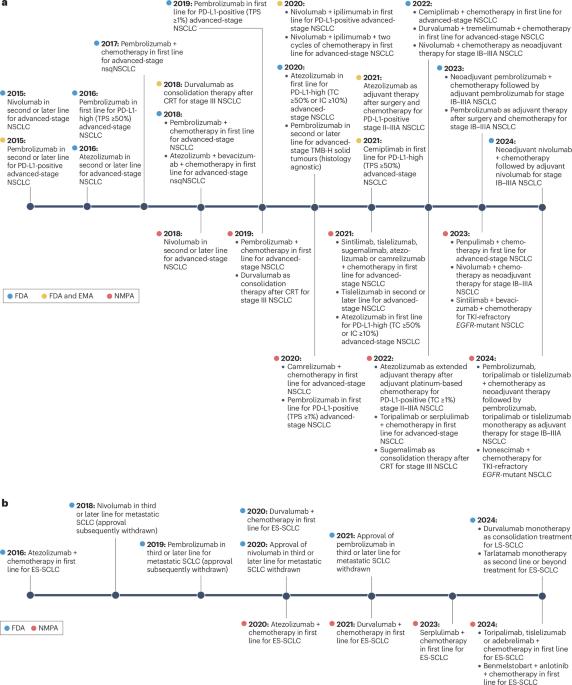The next generation of immunotherapies for lung cancers
IF 82.2
1区 医学
Q1 ONCOLOGY
引用次数: 0
Abstract
Immunotherapies, specifically immune-checkpoint inhibitors (ICIs) targeting PD-(L)1 or CTLA4, have revolutionized the treatment of lung cancer; however, many patients do not have a response to ICIs and most of those with an initial tumour response eventually have disease progression owing to acquired resistance. Over the past few years, numerous therapeutic strategies have been explored to address the problems of intrinsic and acquired resistance to ICIs. In 2024, regulatory approvals of the bispecific PD-1 × VEGF antibody ivonescimab for the treatment of non-small-cell lung cancer in China and the bispecific DLL3 × CD3 T cell engager tarlatamab for patients with small cell lung cancer in the USA provided clinical proof-of-concept for overcoming the challenge of ICI resistance using novel immunotherapeutic agents, thereby increasing enthusiasm for the exploration of next-generation immunotherapies for lung cancer. A large variety of immunotherapies with diverse targets and mechanisms of action are currently being tested in clinical trials involving patients with lung cancer. In this Review, we provide an overview of these emerging immunotherapies in clinical development for non-small-cell lung cancer and/or small cell lung cancer, including novel immune-checkpoint modulators, immune cell engagers, adoptive cell therapies and therapeutic cancer vaccines. We describe the designs of these agents and the mechanisms by which they might overcome resistance to the current generation of ICIs. We also discuss hurdles impeding the clinical translation of each immunotherapeutic modality and potential strategies to address these challenges, using representative examples of agents that have entered the later phases of clinical testing. Immune-checkpoint inhibitors (ICIs) have improved lung cancer outcomes, although resistance to these agents presents a substantial challenge. This Review describes the progress made in developing the next generation of immunotherapies for non-small-cell and small cell lung cancers, including novel immune-checkpoint modulators, immune cell engagers, adoptive cell therapies and therapeutic vaccines, as well as the mechanisms by which these agents might overcome resistance to the current generation of ICIs.


新一代的肺癌免疫疗法
免疫疗法,特别是针对PD-(L)1或CTLA4的免疫检查点抑制剂(ICIs),已经彻底改变了肺癌的治疗;然而,许多患者对ICIs没有反应,并且大多数最初有肿瘤反应的患者最终由于获得性耐药而疾病进展。在过去的几年中,已经探索了许多治疗策略来解决对ICIs的内在和获得性耐药性问题。2024年,中国用于治疗非小细胞肺癌的双特异性PD-1 × VEGF抗体ivonescimab和美国用于治疗小细胞肺癌的双特异性DLL3 × CD3 T细胞接触器tarlatamab获得监管部门批准,为使用新型免疫治疗药物克服ICI耐药的挑战提供了临床概念证明,从而增加了探索下一代肺癌免疫疗法的热情。目前,多种具有不同靶点和作用机制的免疫疗法正在肺癌患者的临床试验中进行测试。在这篇综述中,我们概述了这些新兴的非小细胞肺癌和/或小细胞肺癌的临床开发免疫疗法,包括新型免疫检查点调节剂、免疫细胞接合剂、过继细胞疗法和治疗性癌症疫苗。我们描述了这些试剂的设计和机制,通过它们可能克服对当前一代ICIs的抗性。我们还讨论了阻碍每种免疫治疗模式临床转化的障碍和应对这些挑战的潜在策略,并使用了已进入临床试验后期阶段的代表性药物示例。
本文章由计算机程序翻译,如有差异,请以英文原文为准。
求助全文
约1分钟内获得全文
求助全文
来源期刊
CiteScore
99.40
自引率
0.40%
发文量
114
审稿时长
6-12 weeks
期刊介绍:
Nature Reviews publishes clinical content authored by internationally renowned clinical academics and researchers, catering to readers in the medical sciences at postgraduate levels and beyond. Although targeted at practicing doctors, researchers, and academics within specific specialties, the aim is to ensure accessibility for readers across various medical disciplines. The journal features in-depth Reviews offering authoritative and current information, contextualizing topics within the history and development of a field. Perspectives, News & Views articles, and the Research Highlights section provide topical discussions, opinions, and filtered primary research from diverse medical journals.

 求助内容:
求助内容: 应助结果提醒方式:
应助结果提醒方式:


